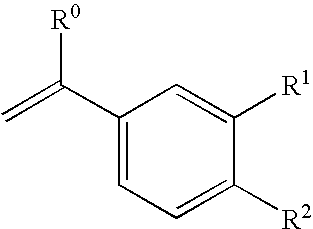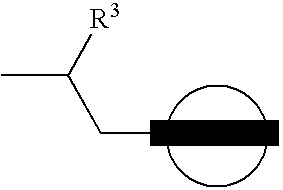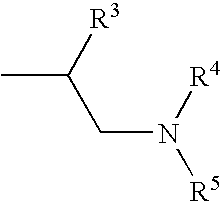Rubber composition and tire
a technology of composition and rubber, applied in the field of rubber composition and tires, can solve the problems of reducing the abrasion resistance of tires, the inability to improve the low heat build-up property, and the decrease in the handling performance (handling stability) of automobiles, and achieves excellent low heat build-up properties and wet grip performan
- Summary
- Abstract
- Description
- Claims
- Application Information
AI Technical Summary
Benefits of technology
Problems solved by technology
Method used
Image
Examples
production example 1
Synthesis of Monomer (1)
[0081]To a 100 ml container in which the air therein was sufficiently substituted with nitrogen were added 50 ml of cyclohexane, 4.1 ml (3.6 g) of pyrrolidine, and 6.5 g of divinylbenzene. Thereto was further added 0.7 ml of 1.6 M n-butyl lithium in hexane at 0° C., and the mixture was stirred. After 1 hour, isopropanol was added to the mixture to stop the reaction, and then extraction and purification were performed to give Monomer (1).
[0082]In the following, respective chemical agents used for the synthesis of Polymers (1) and (2) are listed.
[0083]Cyclohexane: cyclohexane (produced by Kanto Chemical Co., Inc.)
[0084]Styrene: styrene (produced by Kanto Chemical Co., Inc.)
[0085]Butadiene: 1,3-butadiene (produced by Takachiho Chemical Industrial Co., Ltd.)
[0086]Tetramethylethylenediamine:
N,N,N′,N′-tetramethylethylenediamine (produced by Kanto Chemical Co., Inc.)
[0087]1.6 M n-Butyl lithium in hexane: 1.6 M solution of n-butyl lithium in hexane (produced by Kant...
production example 2
Synthesis of Polymer (1)
[0090]To a 1000 ml pressure-resistant container in which the air therein was sufficiently substituted with nitrogen were added 600 ml of cyclohexane, 12.6 ml (11.4 g) of styrene, 71.0 ml (41.0 g) of butadiene, 0.29 g of Monomer (1), and 0.11 ml of tetramethylethylenediamine. Thereto was further added 0.2 ml of 1.6 M n-butyl lithium in hexane at 40° C., and the mixture was stirred. After 3 hours, 3 ml of isopropanol was added to the mixture to stop the polymerization. After adding 1 g of 2,6-tert-butyl-p-cresol to the reaction solution, the solution was subjected to a reprecipitation treatment with methanol, and heated and dried to give Polymer (1).
production example 3
Synthesis of Polymer (2)
[0091]To a 1000 ml pressure-resistant container in which the air therein was sufficiently substituted with nitrogen were added 600 ml of cyclohexane, 12.6 ml (11.4 g) of styrene, 71.0 ml (41.0g) of butadiene, 0.29 g of Monomer (1), and 0.11 ml of tetramethylethylenediamine. Thereto was further added 0.2 ml of 1.6 M n-butyl lithium in hexane at 40° C., and the mixture was stirred. After 3 hours, 0.5 ml (0.49 g) of 3-(N,N-dimethylaminopropyl)trimethoxysilane (a modifying agent) was added to the mixture and stirred. After 1 hour, 3 ml of isopropanol was added to the mixture to stop the polymerization. After adding 1 g of 2,6-tert-butyl-p-cresol to the reaction solution, the solution was subjected to a reprecipitation treatment with methanol, and heated and dried to give Polymer (2).
(Measurement of Weight-Average Molecular Weight (Mw))
[0092]The weight-average molecular weight (Mw) was measured using an apparatus of GPC-8000 series produced by TOSOH CORPORATION w...
PUM
| Property | Measurement | Unit |
|---|---|---|
| particle sizes | aaaaa | aaaaa |
| weight | aaaaa | aaaaa |
| particle size | aaaaa | aaaaa |
Abstract
Description
Claims
Application Information
 Login to View More
Login to View More - R&D
- Intellectual Property
- Life Sciences
- Materials
- Tech Scout
- Unparalleled Data Quality
- Higher Quality Content
- 60% Fewer Hallucinations
Browse by: Latest US Patents, China's latest patents, Technical Efficacy Thesaurus, Application Domain, Technology Topic, Popular Technical Reports.
© 2025 PatSnap. All rights reserved.Legal|Privacy policy|Modern Slavery Act Transparency Statement|Sitemap|About US| Contact US: help@patsnap.com



